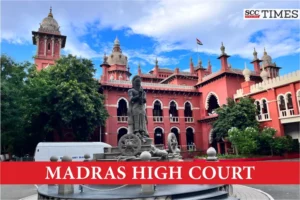Madras High Court: In a writ petition filed against the order passed by State Information Commissioner, wherein the Commissioner has directed the petitioner’s society to furnish all the information to respondent 4 as he sought under Right to Information Act, 2005. (‘RTI Act’), V. Bhavani Subbaroyan, J. while quashing the impugned order, has reiterated that a cooperative society registered under the Tamil Nadu Co-operative Societies Act is not bound by the RTI Act to provide the information requested by a citizen and that the co-operative society does not fall within the definition of “public authority” as defined under Section 2(h) of the RTI Act.
Background:
The petitioner is a society registered under the Tamil Nadu Co-operative Societies Act, 1983. The Management of the Tamil Nadu State Apex Co-operative Bank, District Central Co-operative Bank and Primary Agricultural Co-operative Credit Societies are vest with the Board constituted in accordance with the provisions of the Tamil Nadu Cooperative Societies Act, 1983.
The respondent had requested the information under Section 6(1) of the Right to Information Act on 6 items including the details of the person who availed loan from the petitioner society, copy of resolutions passed in the petitioner society.
The petitioner had contended that the Right to Information Act is not applicable to society. They have not furnished the above information requested by the Deputy Registrar of Co-operative Societies. Hence, respondent 4 had filed an appeal before the Joint Registrar of Co-operative Societies under Section 19(1) of the Right to Information Act, 2005 claiming that they are appellate body and requested to furnish the information sought by him. Thereafter, respondent 4 filed a second appeal before the State Information Commissioner and requested to furnish the information sought by him under the Right to Information. Further, the State Information Commissioner had passed an order directing the petitioner’s society to furnish all the information to the respondent 4 as he sought under Right to Information Act, 2005. Aggrieved by the said order, the petitioner filed this Writ Petition.
Submissions:
Respondent 4 has stated that he is a member of the Co-operative Society for last several years and there are serious allegations raised by various members of the Society against the society administration on allotting the crop loan, jewel loan etc. to the specific persons, who is related with them, based on the forged documents to get waiver from the Government.
Further, it was also stated that in the year 2021, the Government of Tamil Nadu implemented many Loan Waiver Schemes to the benefit of deprived section of the society but due to the corrupt practice of some authorities, considerable portion of the funds went into the pockets of riches and non-eligible persons.
As per the petitioner, society is an autonomous body and is not a public authority within the meaning of Section 2(h) of the Right to Information Act, 2005. The petitioner’s society is not a statutory body and is not performing any public function and will not come with the expression of ‘State’ within the meaning of under Article 12 of the Constitution of India.
Court’s Order
The Court said that a cooperative society registered under the Tamil Nadu Co-operative Societies Act is not bound by the RTI Act to provide the information requested by a citizen and that the co-operative society does not fall within the definition of “public authority” as defined under Section 2(h) of the RTI Act. Therefore, the Court quashed the impugned order passed by the State Information Commissioner.
[The President v. State Information Commissioner, 2024 SCC OnLine Mad 1826, Order dated 06-06-2024]

